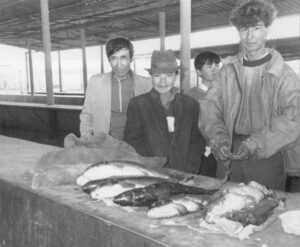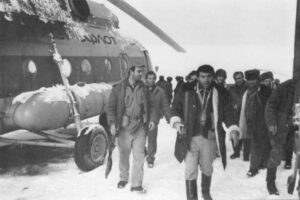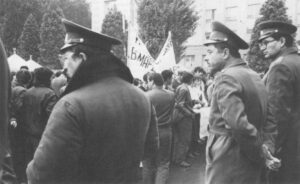James Rupert
- 1991

Fellowship Title:
- The Re-emergence of Central Asia
Fellowship Year:
- 1991

How the Soviets Destroyed a Sea in Thirty Years
Muynak, Uzbekistan – In this frightened town, life has always meant fishing. Men’s faces are leathered by lifetimes on the Aral Sea; their arms thickened by the weight of countless nets hauled from the waters. The women’s hands are scarred from millions of the slices and chops that remove heads and fins from wet, rough fish at the cannery. In Muynak, there are boats and docks. There are anchors and chains. But there is no sea. A stretch of desert that used to be the Aral Sea is shown by Abdulkarim Teleyuov, the former Communist Party secretary in Muynak, Uzbekistan. Fish is now imported more than 2,000 miles by rail and truck from the Baltic Sea. The nightmare began imperceptibly, in the 1960s. Muynak and other towns on the Aral were thriving, hauling 160 tons of fish each day from its shimmering waters. The ovens at Muynak’s massive cannery burned around the clock, cooking sturgeon and carp. The Aral was the world’s fourth-largest lake, bigger than West Virginia, and the live, pulsating heart of a

The Fulcrum that Could Rock Russia and Iran
Photos by APF Fellow James Rupert BAKU, Azerbaijan–In the western Azerbaijani town of Agdam, Fazil Gassimov is a respected man. He is a former school director and collective farm manager who wears his 52 years, like his sweater vest and tweed jacket, with the air of a dapper, educated gentleman. Gassimov knows his history. As he began a lunch of shashlik, salad and vodka one day last March, he sighed sadly over the war between Azeris and Armenians in their joint homeland south of the Caucasus Mountains. History, he told a foreign guest, has recorded that in past centuries Turkic khans ruled most of what is now Azerbaijan and Armenia. That fact, certified by ruins of the khans’ castles on hilltops throughout the region, proves that the land now belongs to the Turkic Azeris, Gassimov explained. The war, over the territory of Nagorno-Karabakh, was the result of treachery by the Armenians: “They arrived here only in the last generations, and we received them hospitably. We gave them land. Now they are saying that it belongs

The Strange State of Soviet Central Asia
Photo by James Rupert TASHKENT, U.S.S.R.-On the night last August that masses of Muscovites undid the Bolshevik Revolution, most people here in the Soviet Union’s fourth largest city appeared not to care. On the flickering television image from Moscow, 1700 miles away, a sea of Russians pressed close to their parliament building, roaring of their victory over the bureaucrats and military officers who had tried to renew the Communist Party dictatorship with an attempted coup. But, at Tashkent’s dreary Sayokhat Hotel, the only witnesses to this history were a group of vacationing Ukrainian office workers. The hotel’s Uzbek employees tended laconically to business, little interested in what the Russians were up to in Moscow. In the restaurant, the usual evening crowd of young Uzbek and Tatar men drank vodka and danced, arms outstretched, to Middle Eastern tunes. An anti-communist demonstration in the center of Dushanbe, in Central Asia. The crowd pressed close at the time of a Supreme Soviet session, which was called to discuss their demands. The demonstrators shouted “Parliament: Resign!” while Tajik militiamen
